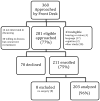Poor Performance on a Preoperative Cognitive Screening Test Predicts Postoperative Complications in Older Orthopedic Surgical Patients
- PMID: 28891828
- PMCID: PMC5657553
- DOI: 10.1097/ALN.0000000000001859
Poor Performance on a Preoperative Cognitive Screening Test Predicts Postoperative Complications in Older Orthopedic Surgical Patients
Abstract
Background: The American College of Surgeons and the American Geriatrics Society have suggested that preoperative cognitive screening should be performed in older surgical patients. We hypothesized that unrecognized cognitive impairment in patients without a history of dementia is a risk factor for development of postoperative complications.
Methods: We enrolled 211 patients 65 yr of age or older without a diagnosis of dementia who were scheduled for an elective hip or knee replacement. Patients were cognitively screened preoperatively using the Mini-Cog and demographic, medical, functional, and emotional/social data were gathered using standard instruments or review of the medical record. Outcomes included discharge to place other than home (primary outcome), delirium, in-hospital medical complications, hospital length-of-stay, 30-day emergency room visits, and mortality. Data were analyzed using univariate and multivariate analyses.
Results: Fifty of 211 (24%) patients screened positive for probable cognitive impairment (Mini-Cog less than or equal to 2). On age-adjusted multivariate analysis, patients with a Mini-Cog score less than or equal to 2 were more likely to be discharged to a place other than home (67% vs. 34%; odds ratio = 3.88, 95% CI = 1.58 to 9.55), develop postoperative delirium (21% vs. 7%; odds ratio = 4.52, 95% CI = 1.30 to 15.68), and have a longer hospital length of stay (hazard ratio = 0.63, 95% CI = 0.42 to 0.95) compared to those with a Mini-Cog score greater than 2.
Conclusions: Many older elective orthopedic surgical patients have probable cognitive impairment preoperatively. Such impairment is associated with development of delirium postoperatively, a longer hospital stay, and lower likelihood of going home upon hospital discharge.
Conflict of interest statement
Conflicts of Interest:
DJC: Director of the American Board of Anesthesiology, Chair of the ABMS Committee on Continuous Certification, ACGME – RRC member, Executive Editor Anesthesiology, ASA committee member; Grant funding: APSF, CRICO, NIA; Lectures: Department of Anesthesiology SUNY, Department of Anesthesiology, Maine Medical Center, Washington State Society of Anesthesiology, Virginia Mason Medical Center, University of Florida (Jacksonville), Mayo Department of Anesthesiology, University of Alabama.
DF: None
MCF: None
JFR: None
HJ: None
CC: None
JRW: None
AMB: None
BTH: NIH
DB: NIH
GC: Grant funding from NIH and CRICO; Editor, Anesthesia and Analgesia; ASA Committee chair and member; Lectures: New York Postgraduate Assembly, California Society of Anesthesiologists, American Society of Anesthesiologists, International Anesthesia Research Society; Industry, The Medicines Company (Scientific Advisory Board).
Figures
References
-
- FICARRA BJ. Preoperative biochemical evaluation of the surgical patient. Am J Surg. 1949:504–506. - PubMed
Publication types
MeSH terms
Grants and funding
LinkOut - more resources
Full Text Sources
Other Literature Sources
Medical


